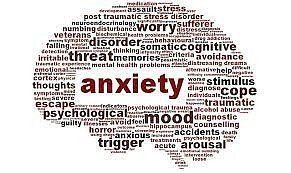Anxiety Disorders
We have all felt anxious when we are worried or nervous about something, those feelings of being tense, nervous and perhaps fearful at the thought of a stressful event or decision you’re facing such as - sitting an exam, attending an interview, moving home, being diagnosed with an illness, etc.
Although we usually find it unpleasant, anxiety is our normal biological reaction to feeling threatened and is related to the ‘fight or flight’ response - increased activity of the Sympathetic Nervous System and release of hormones, such as adrenalin and cortisol, which help physically prepare you to either fight the threat or run away from it.
When does anxiety become a mental health problem?
If your anxious feelings become very strong, or last for a long period, it can be overwhelming. For example:
Psychological sensations:
It’s difficult to know why some people experience anxiety and others don’t, but some potential factors include:
Genetics
Research suggests that people may inherit a genetic tendency to be more anxious than others, particularly if they were concieved during stressful periods e.g. economic crisis, political instability, during war, and similar.
Past or childhood experiences
You may also have learned to feeling anxious in early life. For example, if your family or main guardians had a tendency to see the world as dangerous or hostile.
You may also feel anxious if something distressing happened to you in the past, particularly about facing similar situations again as they may stir up the same feelings.
Diet
Your mood can be affected by your diet on a day-to-day basis, and some foods can mimic and trigger symptoms of anxiety, such as:
Physical and mental health
Physical health can have an impact on mental wellbeing also. For example, if you have a chronic/long-term physical health condition, or experience chronic pain, this can increase vulnerability to experiencing mental health problems such as anxiety or depression.
Likewise, if you are experiencing other mental health problems, such as depression, this can also increase your vulnerability to experiencing problems with anxiety.
Everyday life and habits
Lifestyle and how we spend time day-to-day, can affect how we feel. For example, the following experiences can all contribute to anxiety:
If you are taking prescription medication or recreational drugs, including alcohol, they can affect your mental health. For example, you might experience anxiety as a side effect of:
If you have experienced anxiety for a prolonged period or frequently, you can experience additional effects in your mind and body, such as:
Book In Now
Although we usually find it unpleasant, anxiety is our normal biological reaction to feeling threatened and is related to the ‘fight or flight’ response - increased activity of the Sympathetic Nervous System and release of hormones, such as adrenalin and cortisol, which help physically prepare you to either fight the threat or run away from it.
When does anxiety become a mental health problem?
If your anxious feelings become very strong, or last for a long period, it can be overwhelming. For example:
- You may find you are worrying constantly, perhaps about things that are a part of regular everyday life, or about things that are unlikely to happen – or just worrying about worrying.
- You might regularly experience unpleasant psychological and physical effects of anxiety, and maybe panic attacks.
- Depending on the kind of problems you experience, you might be given a diagnosis of a specific anxiety disorder.
Psychological sensations:
- feeling your mind is really busy with thoughts
- feeling tense, nervous and on edge
- feeling restless and not being able to concentrate
- rumination- dwelling on negative experiences, or thinking over a situation again and again (this is called )
- having a sense of dread, or fearing the worst
- feeling emotionally numb
- feeling like the world is speeding up or slowing down
- feeling like other people can see you’re anxious and are looking at you
- raised blood pressure
- a rapid, thumping or irregular heart beat
- rapid breathing
- experiencing panic attacks
- difficulty sleeping
- headaches
- nausea
- tension in muscles
- excessive sweating or hot flushes
- feeling light headed or dizzy
- pins and needles
- change in toilet habits, increased or decreased frequency
- churning sensation in the stomach
It’s difficult to know why some people experience anxiety and others don’t, but some potential factors include:
- genetics
- past or childhood experiences
- diet - food and drink
- physical and mental health
- everyday life and habits
- any drugs or medication you might be taking
Genetics
Research suggests that people may inherit a genetic tendency to be more anxious than others, particularly if they were concieved during stressful periods e.g. economic crisis, political instability, during war, and similar.
Past or childhood experiences
You may also have learned to feeling anxious in early life. For example, if your family or main guardians had a tendency to see the world as dangerous or hostile.
You may also feel anxious if something distressing happened to you in the past, particularly about facing similar situations again as they may stir up the same feelings.
Diet
Your mood can be affected by your diet on a day-to-day basis, and some foods can mimic and trigger symptoms of anxiety, such as:
- drinking caffeine
- eating lots of sugar
- poor diet overall - high in processed foods
Physical and mental health
Physical health can have an impact on mental wellbeing also. For example, if you have a chronic/long-term physical health condition, or experience chronic pain, this can increase vulnerability to experiencing mental health problems such as anxiety or depression.
Likewise, if you are experiencing other mental health problems, such as depression, this can also increase your vulnerability to experiencing problems with anxiety.
Everyday life and habits
Lifestyle and how we spend time day-to-day, can affect how we feel. For example, the following experiences can all contribute to anxiety:
- pressure at home, at work, or on your course if you’re studying
- long working hours
- exhaustion or stress
- money problems
- housing problems
If you are taking prescription medication or recreational drugs, including alcohol, they can affect your mental health. For example, you might experience anxiety as a side effect of:
- certain psychiatric medication for mental health problems
- certain medication for other health problems, such as steroids or some anti-malaria medication
- recreational drugs or alcohol
- generalised anxiety disorder (GAD)
- panic disorder
- post-traumatic stress disorder (PTSD)
- obsessive-compulsive disorder (OCD)
If you have experienced anxiety for a prolonged period or frequently, you can experience additional effects in your mind and body, such as:
- depression
- sleep problems such as insomnia
- lowered immune system, making you more susceptible to certain illnesses such as cold and flu
- a decrease in libido
- smoking or drinking excess alcohol, or misusing prescription and/or recreational drugs to cope
- keeping a job
- developing or maintaining relationships
- enjoying leisure activities

Generalised Anxiety Disorder
If you have felt anxious for a long period and you are often fearful, but are not anxious about anything that is happening in your life specifically, you may well be diagnosed with GAD.
Unfortunately this can be quite a broad diagnosis, because there are lots of potential signs and symptoms, and effects of anxiety. This also means that the way you experience GAD might be quite different from another person's experiences, despite the same diagnosis.You may experience some, all or any combination of the psychological and physical symptoms listed in the previous section.
If you believe that you might have GAD then you should seek medical advice. There are also many ways CANN may be able to assist in reducing your risk for and prevention of GAD. The functional medicine based approach we use at CANN looks at what are the antecedents, triggers and mediators. Working with the individual to investigate and then build a programme of nutrition, nutraceutical and lifestyle changes. We CANN help!
Book In Now
Unfortunately this can be quite a broad diagnosis, because there are lots of potential signs and symptoms, and effects of anxiety. This also means that the way you experience GAD might be quite different from another person's experiences, despite the same diagnosis.You may experience some, all or any combination of the psychological and physical symptoms listed in the previous section.
If you believe that you might have GAD then you should seek medical advice. There are also many ways CANN may be able to assist in reducing your risk for and prevention of GAD. The functional medicine based approach we use at CANN looks at what are the antecedents, triggers and mediators. Working with the individual to investigate and then build a programme of nutrition, nutraceutical and lifestyle changes. We CANN help!

Panic Disorder (Attacks)
If you suffer panic attacks that are seemingly unpredictable and cannot identify what triggers them, you might be given a diagnosis of panic disorder.
Suffering panic disorder may mean constantly feeling afraid of having another panic attack, to the extreme where the fear itself can trigger panic attacks.
What are Panic Attacks?
Panic attacks are an exaggeration of the body’s normal response to fear, stress or excitement, the fight-or-flight response. People often experience a rapid build-up of overwhelming physical sensations, such as:
If you believe that you might have panic disorder then you should seek medical advice. There are also many ways CANN may be able to assist in reducing your risk for and prevention of panic disorder. The functional medicine based approach we use at CANN looks at what are the antecedents, triggers and mediators. Working with the individual to investigate and then build a programme of nutrition, nutraceutical and lifestyle changes. We CANN help!
Book In Now
Suffering panic disorder may mean constantly feeling afraid of having another panic attack, to the extreme where the fear itself can trigger panic attacks.
What are Panic Attacks?
Panic attacks are an exaggeration of the body’s normal response to fear, stress or excitement, the fight-or-flight response. People often experience a rapid build-up of overwhelming physical sensations, such as:
- a rapid and stronger heartbeat
- chest pains
- feeling unable to breathe
- feeling faint
- sweating
- nausea
- shaky limbs, or feeling like your legs are wobbly
- feeling disconnected from your body
If you believe that you might have panic disorder then you should seek medical advice. There are also many ways CANN may be able to assist in reducing your risk for and prevention of panic disorder. The functional medicine based approach we use at CANN looks at what are the antecedents, triggers and mediators. Working with the individual to investigate and then build a programme of nutrition, nutraceutical and lifestyle changes. We CANN help!

